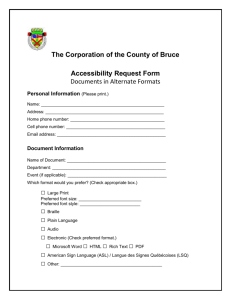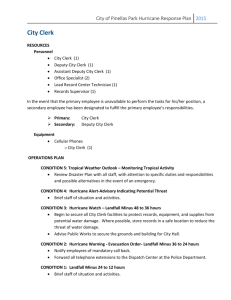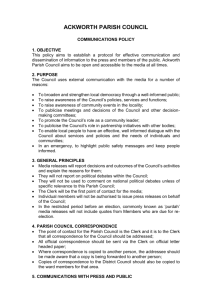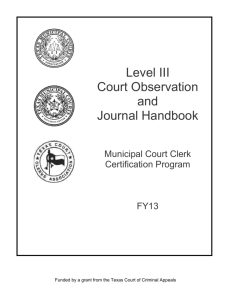LFO Collections
advertisement
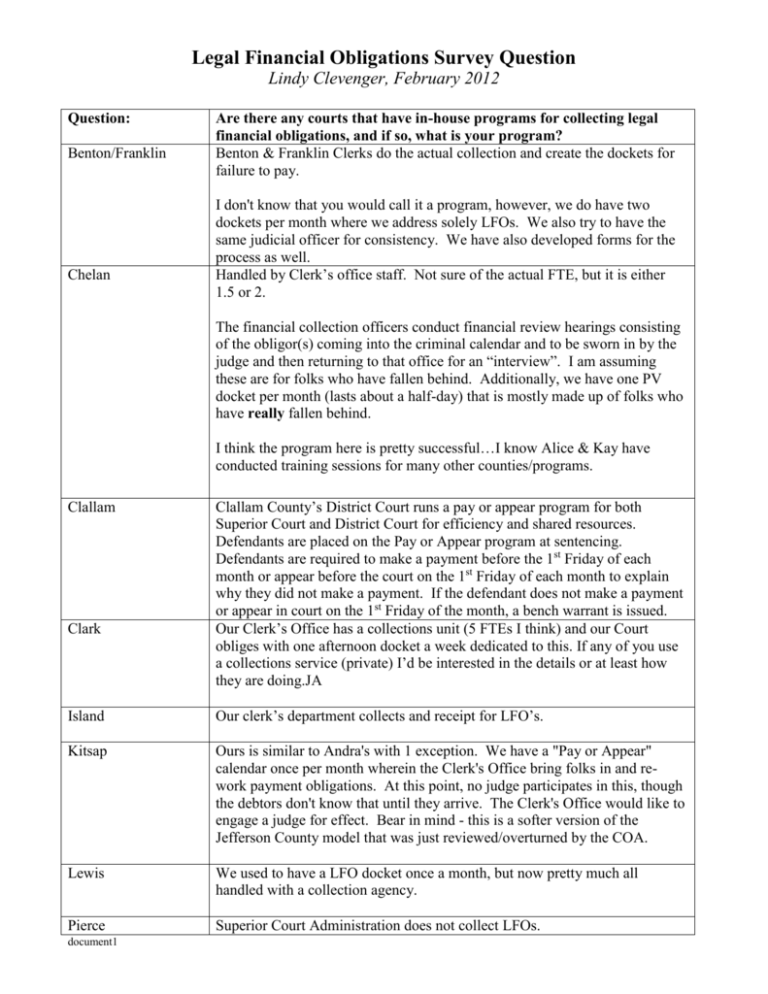
Legal Financial Obligations Survey Question Lindy Clevenger, February 2012 Question: Benton/Franklin Chelan Are there any courts that have in-house programs for collecting legal financial obligations, and if so, what is your program? Benton & Franklin Clerks do the actual collection and create the dockets for failure to pay. I don't know that you would call it a program, however, we do have two dockets per month where we address solely LFOs. We also try to have the same judicial officer for consistency. We have also developed forms for the process as well. Handled by Clerk’s office staff. Not sure of the actual FTE, but it is either 1.5 or 2. The financial collection officers conduct financial review hearings consisting of the obligor(s) coming into the criminal calendar and to be sworn in by the judge and then returning to that office for an “interview”. I am assuming these are for folks who have fallen behind. Additionally, we have one PV docket per month (lasts about a half-day) that is mostly made up of folks who have really fallen behind. I think the program here is pretty successful…I know Alice & Kay have conducted training sessions for many other counties/programs. Clallam Clark Clallam County’s District Court runs a pay or appear program for both Superior Court and District Court for efficiency and shared resources. Defendants are placed on the Pay or Appear program at sentencing. Defendants are required to make a payment before the 1st Friday of each month or appear before the court on the 1st Friday of each month to explain why they did not make a payment. If the defendant does not make a payment or appear in court on the 1st Friday of the month, a bench warrant is issued. Our Clerk’s Office has a collections unit (5 FTEs I think) and our Court obliges with one afternoon docket a week dedicated to this. If any of you use a collections service (private) I’d be interested in the details or at least how they are doing.JA Island Our clerk’s department collects and receipt for LFO’s. Kitsap Ours is similar to Andra's with 1 exception. We have a "Pay or Appear" calendar once per month wherein the Clerk's Office bring folks in and rework payment obligations. At this point, no judge participates in this, though the debtors don't know that until they arrive. The Clerk's Office would like to engage a judge for effect. Bear in mind - this is a softer version of the Jefferson County model that was just reviewed/overturned by the COA. Lewis We used to have a LFO docket once a month, but now pretty much all handled with a collection agency. Pierce Superior Court Administration does not collect LFOs. document1 The Clerk’s Office is responsible for collecting LFO’s. They do not have an “in-house” program, just a cashier that accepts the payment. If they aren’t paid, they are sent to Alliance One (Collection Agency). Skagit The Skagit County Clerk’s Office does have an in-house collection program. We have 1 FT collector, and other clerks that help with processing returned mail, mailing notices and preparing other paperwork, as time allows. We use a variety of methods to attempt collection from defendants that are not paying a monthly payment – post card notices, collection letters, phone calls, Administrative Reviews, Court Review Hearings, Wage Assignment, and possibly assignment to an outside collection agency. If it appears the address we have on file is valid for the defendant, we send a Notice for Administrative Review Hearing. This requires the defendant to make a payment arrangement on or prior to the Review date. The Reviews are held in a courtroom, however it is not. The defendants come in and meet with one of 2 clerks in the courtroom. We go over the specifics of their LFO’s – answer any questions they may have, and attempt to make a payment plan to move forward. Once a payment plan is made, we set future reviews every 3-6 months to ensure the defendant is maintaining a good payment history and contacting the clerk if needed. We try to use this review type as much as possible, to avoid taking up court time. Notices for Financial Review Hearing are sent for cases with larger restitution balances (usually over $5000), as well as for defendants that are difficult to work with. These are during a regular Criminal Calendar, and a Bench Warrant is issued if the defendant fails to appear. I request Prosecutor assistance on most of these cases – and they will call the case on the record. If at all possible, I will work with the defendant to have an agreed order entered, instead of requiring the case be called & argued on the record. Both the Administrative Reviews & the Financial Review hearings are also used for cases that we are seeking an increased payment – even if the defendant is in compliance with the current monthly payment ordered. Again – the goal is to keep the matter out of the courtroom. If we can come to an agreed payment amount, we will simply enter an agreed order, which may be signed during the Ex Parte Calendar. If attempts to contact the defendant have failed, we search for possible wages. If a defendant is found to be employed, we may issue a notice of involuntary wage assignment for up to 25% of disposable earnings. The actual % or fixed $ amount depends on earnings, age of case & length of time employed. It is not our intent to put a defendant in a situation they are not able to pay their basic living expenses. There are many defendants that I simply call regarding a past due amount, eliminating the need to mail notices. I also field many calls from defendants calling on their own initiative, as well as from victims asking about restitution payments. Many of the Public Defenders send their clients to see me on the document1 day of sentencing to go over the LFO’s and minimum payments ordered, and some are ordered to come see me when they are in court for a review for compliance with their judgment & sentence. We are still developing a collection process for juvenile cases after the respondent has turned 18, as well as for the Parent Financial Obligations ordered in juvenile cases. Snohomish An outside collection agency is used for the Juvenile/parent cases that do not respond to our attempts to set up a payment plan. Info provide by Deputy Clerk, Teri Bordua Our clerk’s office facilitates a collection process and we have a couple of calendars for LFO’s. In our drug courts we track restitution and parties pay to the Prosecutor. But as for Superior Court collecting LFO’s – our staff does not directly take in money for these obligations. Spokane I stand corrected. Our clerk has issued an RFP for a collection company contract. It is pending. Stevens One of the Deputy Clerks in Stevens County is the collection queen here. She is very successful in collecting fines and restitution for the adult criminal convictions. Last year alone she collected between $200,000 and $300,000. And she’s a bulldog. We have a collections calendar once a month in front of our Court Commissioner. Just shows that if you have the right person in that role, it can be very successful. Evelyn Thurston Co. monitors LFO’s by a Friday non-compliance calendar & LFOs are monitored as part of their treatment compliance calendar. The can have as many as 80 persons on their non-compliance calendar. Those calendars are prepared by the Clerk’s Office, and the Clerk prepares show cause orders to give defendants notice of the compliance calendar. If defendants fail to appear for the show cause, a bench warrant is issued. We do not have anything in Superior Court because our Clerk of the Court handles all fines, fees, etc. However, in District Court we have a contract with a local collection agency. They provide a full time person Monday through Friday and we provide the space. She handles any phone calls or customers that have been sent to collections. It really helps cut down on the number of hours our staff are dealing with clients. Robyn Berndt Thurston Yakima n:\programs & organizations\awsca\surveys\lfo 2012.docx document1

